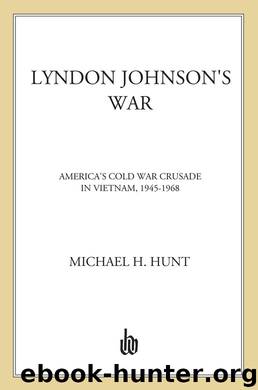Lyndon Johnson's War by Michael H. Hunt

Author:Michael H. Hunt
Language: eng
Format: epub
Published: 2011-06-14T16:00:00+00:00
4
“THAT BITCH OF A WAR”
Lyndon Johnson loved folksy, vivid language. It came to him as readily in formal White House meetings as on the hustings in his native Texas. Not surprisingly, it repeatedly cropped up vis-à-vis Vietnam. In perhaps his most famous characterization, Johnson referred to Vietnam, from the perspective of retirement, as “that bitch of a war on the other side of the world.” She had driven away “the woman I really loved—the Great Society” and with her “my hopes to feed the hungry and shelter the homeless” and “my dreams to provide education and medical care to the browns and the blacks and the lame and the poor.”1
Johnson’s remarks made Vietnam seem something that the Fates had visited on him. His words suggest that Johnson felt himself victimized—led astray by the allure of “the bitch.” While this highly charged, gendered language tells us something important about LBJ’s own style and outlook, it also obscures the critical decisions that Johnson himself made as he turned a war heavily backed by the United States into one actually fought by Americans.
The person who made those decisions was a Texas politician with deep agrarian roots, a strong faith in the capacity of the government to help people, a pronounced macho outlook, and, above all, an oversized, complicated personality. Any attempt to understand Johnson’s role in Vietnam must go back well before 22 November 1963, the day of John Kennedy’s assassination and Johnson’s swearing in as president. The natural starting point is 27 August 1908, the day of his birth on a farm located alongside the Pedernales River deep in the Texas Hill Country, a distinct region extending just west of Austin of harsh, eroded limestone hills and narrow river valleys. A frontier backwater, still isolated from the rest of the state, the Hill Country could provide its inhabitants only limited education, medical care, and electrical power.
LBJ grew up on the family farm and in a neat wood-frame house in nearby Johnson City (the county seat named for a relative). Part of a large and extended clan, he was surrounded by grandparents, cousins, aunts, and uncles as well as four siblings. His was a comfortable and secure, though hardly affluent, childhood in which he was loved—and spoiled. LBJ’s father, Samuel Ealy Johnson, Jr., was a sometime farmer whose love of politics secured him a place in the state legislature between 1917 and 1924. His mother, Rebekah Baines Johnson, was genteel, college-educated, and uncomfortable with the rustic Hill Country and the exuberant, gregarious, rough-hewn Johnsons.
From his father Lyndon acquired an expansive personality and the extrovert’s love of the public stage, and from his mother the drive to succeed. No academic whiz kid who could match the best and the brightest, he was a mediocre student right down through high school. In 1927, after a period of wanderlust, he enrolled at Southwest Texas State Teachers College in San Marcos. It was inexpensive, accessible, and academically undemanding, and it kept LBJ in the protective, supportive embrace of his extended family.
Download
This site does not store any files on its server. We only index and link to content provided by other sites. Please contact the content providers to delete copyright contents if any and email us, we'll remove relevant links or contents immediately.
| Afghan & Iraq Wars | American Civil War |
| American Revolution | Vietnam War |
| World War I | World War II |
Waking Up in Heaven: A True Story of Brokenness, Heaven, and Life Again by McVea Crystal & Tresniowski Alex(37004)
Empire of the Sikhs by Patwant Singh(22173)
We're Going to Need More Wine by Gabrielle Union(18074)
Hans Sturm: A Soldier's Odyssey on the Eastern Front by Gordon Williamson(16636)
Leonardo da Vinci by Walter Isaacson(11903)
The Radium Girls by Kate Moore(10907)
Educated by Tara Westover(7063)
Tools of Titans by Timothy Ferriss(6950)
How to Be a Bawse: A Guide to Conquering Life by Lilly Singh(6693)
The Last Black Unicorn by Tiffany Haddish(5075)
Permanent Record by Edward Snowden(4999)
The Rise and Fall of Senator Joe McCarthy by James Cross Giblin(4845)
Promise Me, Dad by Joe Biden(4449)
The Wind in My Hair by Masih Alinejad(4424)
The Crown by Robert Lacey(4105)
A Higher Loyalty: Truth, Lies, and Leadership by James Comey(4033)
The Iron Duke by The Iron Duke(3639)
Joan of Arc by Mary Gordon(3259)
How to be Champion: My Autobiography by Sarah Millican(3186)
